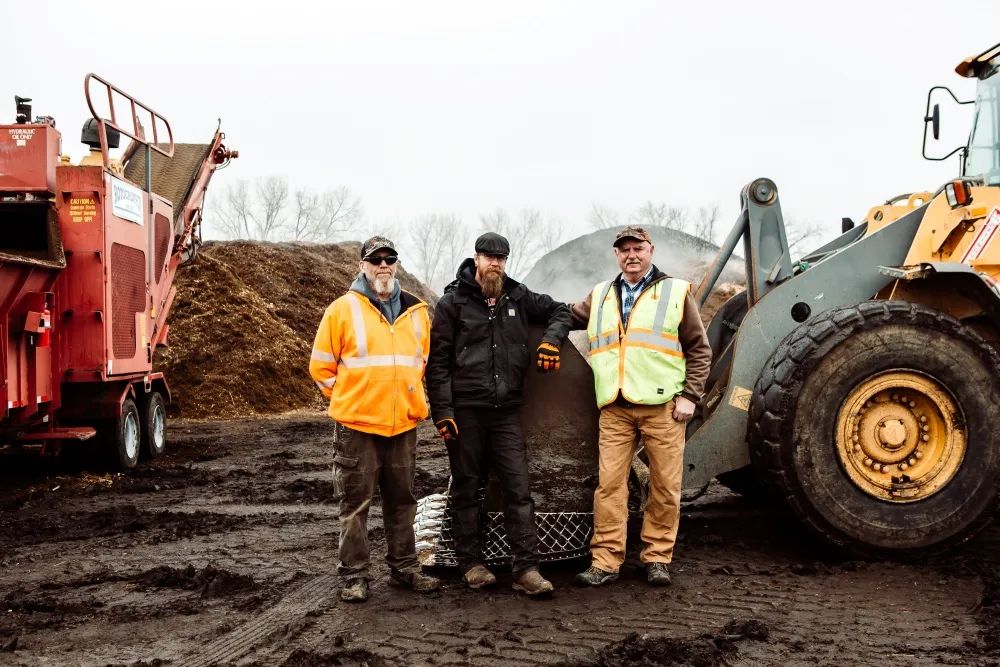
Meet the Maker: J.B. Farley of Agri Organics
April 2022
by anna rogers | photos by arianna skoog
On the surface, J.B. Farley is making… dirt?
Not exactly. Dirt is just displaced soil, like when your hands get “dirty” from working in the yard. Soil is living – a complex mixture of topsoil, sand, and organic matter, teeming with living organisms like fungi, insects, and bacteria.
J.B. Farley and his team at Agri Organics are taking community waste and making it alive. In its new life, this thriving, organic compost is going on to feed our community’s trees, pollinators, yards, and food-producing soils.
The Dream
J.B. started composting cattle manure in the ‘90s and began using it to make amended soils in 2000. In 2010, Jason Fasching came on board. “We decided to focus on compost,” Jason says. We see the value financially but most importantly in sustainability. J.B. and I take a lot of pride in it, and we hope to see the world change. We’ve experienced growth because we care.”
For J.B. and his team, the goal is more than just making high-quality compost that goes back to enriching the earth. It’s also about partnering with the community to make this happen.
“We want to change the mentality in our community from ‘have-to’ to ‘want-to.’ We’re slowly trying to change the culture.” It takes an extra effort to sort waste and ensure that the materials sourced are non-synthetic for a certified organic finished product. It takes extra time to ensure each batch of compost is perfectly balanced and completed. For J.B. Farley, it’s worth the extra effort.
The Process
The compost process is happening all around us in nature every day. At Agri Organics, they source the right formula of materials, bring them together, and then let nature do its thing. It takes a lot of carbon and some nitrogen to kick-start the composting process. They source tree products (branches and leaves), materials from the livestock industry like straw and manures, and work with local organizations to collect materials, like Swift Buckets’ food scraps and Montana Custom Mill Works’ bark and sawdust. These materials are homogenized with the help of a grinder, and water is added. “We put it in a big pile and let the micro-organisms do what they do!”
Depending on the season, the process can take anywhere from five to nine months from start to finish. “It takes a lot of patience. We’re trying to make an authentic product – a good, legitimate product to go back into the soils.” There’s no rushing it or cutting corners. When a batch is ready, it’s screened, STA tested and certified, and distributed to Agri Organics’ wholesale partners, available to the community through these partners. You can purchase Agri Organics’ finished product from Good Earth Works, Tvetene Turf, Billings Nursery, and Baldwin Nursery in Red Lodge.
The Goal
With a high demand for finished compost, the biggest challenges for J.B. and his team are sourcing enough non-synthetic raw materials and making enough compost for the community. They have recently expanded to two locations. Along with their business growth, they hope to connect with municipalities, businesses, livestock operations, and even local schools to set up on-site composting programs.
On the front end of the composting process, local waste can be diverted from the landfill and utilized to create a product that pours back into the community. On the back end, these rich soils can grow nutritious food for the community and support healthy vegetation.
Healthy Soil = Healthy Plants = Healthy People = Healthy Community!
Learn more about J.B. Farley and Agri Organics by visiting their website agriorganics.org.
Originally printed in the April 2022 issue of Simply Local Magazine
Never miss an issue, check out SLM's digital editions here!





